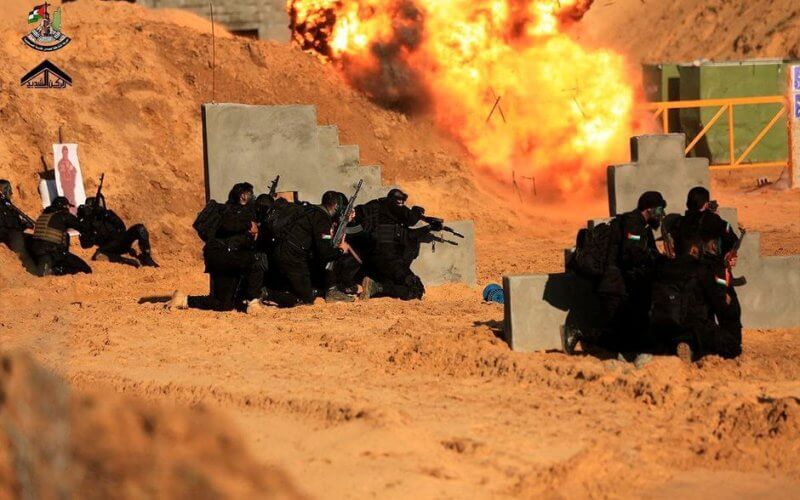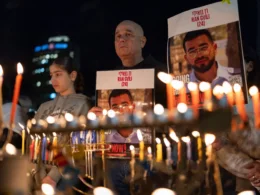In a recent interview with the Egyptian website Al-Masir, Hassan Hoballah, a Hezbollah official in charge of Palestinian relations, revealed that the Shiite Lebanese terrorist group has worked hand-in-glove with Hamas throughout the Middle East.
Hamas fighters, according to Hoballah, were "trained in Lebanon, Syria and Iran." In the interview with the Egyptian outlet, the Hezbollah official mentioned that the group "has an alliance with the Palestinian resistance on every level" and "aids the Palestinian resistance with everything it has, with weapons and training."
The Hezbollah official noted that while Hezbollah has no intention of turning the war with Israel into a regional conflict, it could escalate the war into a broader one if Hamas is defeated or Palestinians are expelled from Gaza.
"I believe that the war is nearing its end because the Zionist entity has used all the brutal force at its disposal, including [by waging] a ground war and [using] commando forces and all these operations failed. And the United States, which is managing this campaign along with Israel, has started to demand that Netanyahu replace his extremist government and his war cabinet. I do not deny the existence of immense difficulties in Gaza, but [the Gazans will remain] patient and steadfast until victory is achieved, Allah willing," Hoballah said when asked whether he sees the conflict with Israel expanding into a larger war.
Hezbollah media denied that Hoballah was interviewed by Al-Masir, even though the article includes pictures of Hoballah with the outlet's editors.
Hoballah's interview with Al-Masir came as Hezbollah's Deputy Secretary-General Na'im Qassem told the same outlet that the terrorist group would join the conflict against Israel if Hamas were defeated or Gazans were expelled.
Qassem added that the present war with Israel will not be the final one and that the next war will involve the entire "resistance axis," including the Islamic Republic of Iran and its proxies.
"For the resistance, victory means thwarting the enemy's goals. The resistance is not an army that can invade and liberate the land, and if it does liberate land, it does not have the ability to remain there [long] because the enemy has immense firepower in the land, sea, and air. So, the victory of the resistance is thwarting the enemy's plan, as happened in the 2006 Lebanon war, when Israel destroyed the Dahiya in southern [Beirut] and destroyed the bridges and villages and Lebanon's infrastructures but could not harm the resistance. More than that, it did not manage to advance [even] five kilometers into Lebanon," Hoballah told Al-Masir.
Hoballah went on to explain that if the entirety of Hezbollah enters the conflict, it will "turn from a war for the liberation of Palestine into a regional war," which, according to him, would "end with a regional agreement, a ceasefire agreement or an international resolution, and then the Palestinian right will be lost."
"As long as the [Palestinian] resistance is in the lead and has not been defeated, we will continue the limited conflict," he said.
However, Hoballah noted that if "things head in the direction of a complete defeat for Hamas, we will enter a comprehensive war, for we will not allow the defeat of the Palestinian resistance, and especially of Hamas, which is the goal [of Israel's] offensive."
Hoballah spoke about how Israel is carefully considering how to "eliminate the threat posed by Hezbollah" post-Gaza-war. "
He explained that Hezbollah is aware of Israel and its Western allies' intention to "strengthen the UNIFIL forces and the Lebanese army and to offer Hezbollah incentives [such as an Israeli] withdrawal from disputed points and places in the sea and on land, including the Shab'a Farms, despite their strategic importance [for Israel]." In return for such actions, Hoballah claimed that the U.S. has promised Israel to "construct a three-story barrier that will prevent Hezbollah from having an advantage over Israel once it receives the Shab'a Farms. Hezbollah [will receive] all this [just] in return for its withdrawal from the campaign.
Hoballah said this "reflects the power of the South Lebanon resistance front and the important role it plays in easing the pressure on Gaza."
Asked about the ongoing attacks instigated by the Iranian-backed Houthis against U.S. Naval vessels and commercial ships, Hoballah praised the terrorist group and their pro-Islamic slogans and anti-Western sentiments.
He described Yemen as a "strategic location" and mentioned the country’s support for the "Palestinian resistance."
"Yemen has been standing with the resistance ever since the outbreak of the Palestinian revolution in the 1960s," he told Al-Masir.
Following the Oct. 7 massacre by Hamas against the Jewish state, Hezbollah Secretary-General Hassan Nasrallah has given several speeches reiterating his support for the attack while calling on Muslims throughout the Middle East region to support Hamas against Israel.
Since the start of Israel's ground incursion into the Gaza Strip, Hezbollah has fired multiple missiles into Northern Israel while sending fighters to try and infiltrate the Northern Border.
Israeli Prime Minister Benjamin (Bibi) Netanyahu and Defense Minister Yoav Gallant have called on Hezbollah to stand down or face serious consequences.
Related Story: Hezbollah Will Use Unconventional Weapons Against Israel if War Escalates: Source









